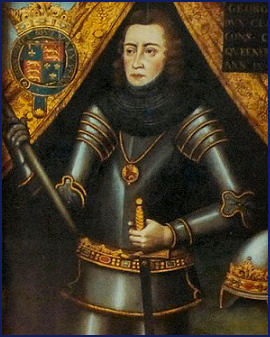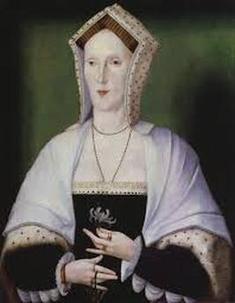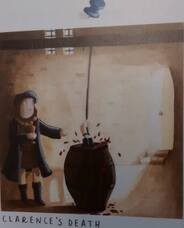George was one of the sons of Richard, Duke of York and Cecily Neville, he has been described as misunderstood and ambitious, Shakespeare calls him
In some ways, I do feel sorry for him, and I have often wondered if we could apply the modern term 'middle child syndrome' to help understand his personality. Maybe it was his position within his family that made him the man he was, looking at the personality traits of a modern 'middle child' surprisingly Clarence fits the 'profile' on a number of points.
1. Middle children are not particularly interested in family hierarchy or ranking:
Clarence could not have cared less that his brother was king, he would undermine him given an opportunity, he had joined in all the careless talk, calling into question the legitimacy of the king's birth. His later actions convinced Edward that he was looking to take the throne out from under him.
2. Middle children are more interested in taking advice from others outside the main family group:
Clarence was reliant on his cousin Richard Neville rather than Edward or Richard. He took Neville's 'advice' on more than one occasion, joining him in supporting a northern rebellion and went along with the idea to restore King Henry VI to the throne of England, realising too late that listening to Neville was not a good idea after all.
3. Middle children are risk-takers and are more rebellious than their siblings:
Clarence certainly ticks both of these boxes. By rebelling with Neville, Clarence risked everything and lost. He lost his position as Lord Lieutenant of Ireland, and by organising yet another rebellion, because of the loss of his Warwick lands to Richard, he caused a major rift that was ultimately the last nail in his coffin.
4. Middle children don't like conflict:
This is one category that Clarence doesn't fit into.
Of course, Clarence wasn't a middle child at all, he was number six of seven so you could argue that this hypothesis doesn't make any sense at all, but it does if you look at it from the point of view that he was eventually slap bang in the middle of three boys. His older brother Edmund had died at the Battle of Wakefield aged just seventeen, I wonder if he had lived, he would have shown the same personality traits as Clarence, or would Clarence have been a different person altogether?
Supposition this maybe, but whatever the cause Clarence turned out to be a weak self-centred man, and in the end, it was greed and jealousy that cost him his life.
So, what was going on within the royal family, the royal court and the country as a whole that caused a brother of two kings of England to be arrested and charged with the crime of treason? It seems that there was reason enough for Clarence to be incarcerated in the Tower of London and charged. There can be no doubt that George was in trouble.
The Crowland Chronicles suggest that the ill feeling had been brewing between the brothers for some time and in a superstitious age, Edward may have been concerned with the prophecy that someone whose name began with the letter G would take his kingdom from him. Most certainly Edward was building up some sort of list of information to be used against his brother, and this prophecy added weight to his theory that George had his eye on his throne. But what about Richard, a future king of England. Was he whispering in the king's ear about Clarence as some historians suggest?
Naturally, Shakespeare has Richard playing his part in Clarence's downfall but surprisingly the 'expert' on the subject of Richard III, Sir Thomas More, is doubtful of Richards's guilt even Shakespeare's 'biggest fan' the nineteenth-century historian James Gairdner, doesn't think he was guilty either, he writes
" he (Richard) was lukewarm in his opposition and should be considered guiltless of his brothers death"
But according to Professor Michael Hicks, George's conviction was a
" Precondition for Gloucester's accession in 1483"
So George was accused of rebellion, slander and allegiances with the 'enemy' and the date set for the trial was probably around 20th January. The king was said to have attended stating that his brother was
'guilty of unnatural, loathly treasons'
The act regarding these charges is still in existence. Within the Crowland Chronicle it is written
"no one spoke against the duke but the king, and no one answered but the duke"
Towards the end of the trial, in a desperate attempt at a chance of coming out of this affair with his life, Clarence offers to prove his innocence in personal combat, but in the end, a guilty verdict was read out by the Duke of Buckingham and George, Duke of Clarence, had to wait just under a month for his execution.
There is no evidence of how Clarence met his end, but the barrel of wine story persists as these things do.
As proof that drowning was the manner of George's death the painting below has been cited. Clarence's daughter Margaret Pole wears a tiny barrel charm on a bracelet which is taken to represent her father's death! Of course, this is the usual case of fabricating the evidence to fit the crime. Not only did this one tiny detail added weight to the vat of wine theory but it meant that this portrait has been wrongly attributed.
Probably Edward. Maybe Richard. But ultimately it was George himself. He was his own worst enemy.
*John Ashdown Hills biography on the Duke of Clarence is available here
http://www.johnashdownhill.com/the-third-plantagenet-george-duke-of-clarence/



 RSS Feed
RSS Feed
